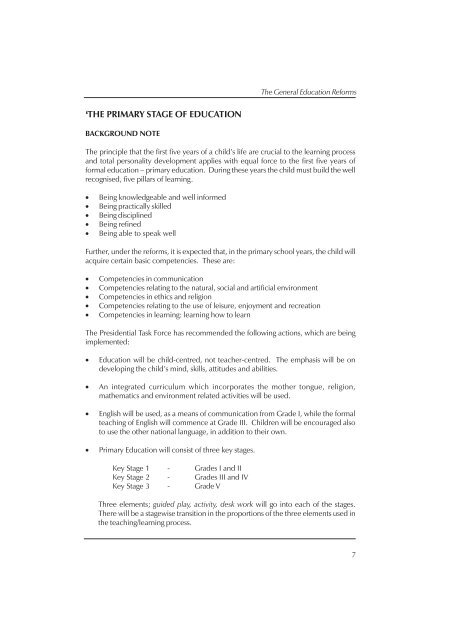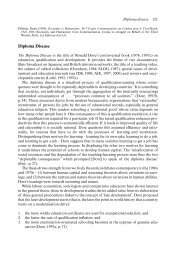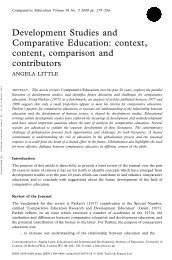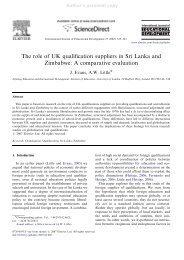Primary Education Reform in Sri Lanka - Angela Little's website
Primary Education Reform in Sri Lanka - Angela Little's website
Primary Education Reform in Sri Lanka - Angela Little's website
You also want an ePaper? Increase the reach of your titles
YUMPU automatically turns print PDFs into web optimized ePapers that Google loves.
‘<br />
THE PRIMARY STAGE OF EDUCATION<br />
BACKGROUND NOTE<br />
The General <strong>Education</strong> <strong>Reform</strong>s<br />
The pr<strong>in</strong>ciple that the first five years of a child’s life are crucial to the learn<strong>in</strong>g process<br />
and total personality development applies with equal force to the first five years of<br />
formal education – primary education. Dur<strong>in</strong>g these years the child must build the well<br />
recognised, five pillars of learn<strong>in</strong>g.<br />
• Be<strong>in</strong>g knowledgeable and well <strong>in</strong>formed<br />
• Be<strong>in</strong>g practically skilled<br />
• Be<strong>in</strong>g discipl<strong>in</strong>ed<br />
• Be<strong>in</strong>g ref<strong>in</strong>ed<br />
• Be<strong>in</strong>g able to speak well<br />
Further, under the reforms, it is expected that, <strong>in</strong> the primary school years, the child will<br />
acquire certa<strong>in</strong> basic competencies. These are:<br />
• Competencies <strong>in</strong> communication<br />
• Competencies relat<strong>in</strong>g to the natural, social and artificial environment<br />
• Competencies <strong>in</strong> ethics and religion<br />
• Competencies relat<strong>in</strong>g to the use of leisure, enjoyment and recreation<br />
• Competencies <strong>in</strong> learn<strong>in</strong>g: learn<strong>in</strong>g how to learn<br />
The Presidential Task Force has recommended the follow<strong>in</strong>g actions, which are be<strong>in</strong>g<br />
implemented:<br />
• <strong>Education</strong> will be child-centred, not teacher-centred. The emphasis will be on<br />
develop<strong>in</strong>g the child’s m<strong>in</strong>d, skills, attitudes and abilities.<br />
• An <strong>in</strong>tegrated curriculum which <strong>in</strong>corporates the mother tongue, religion,<br />
mathematics and environment related activities will be used.<br />
• English will be used, as a means of communication from Grade I, while the formal<br />
teach<strong>in</strong>g of English will commence at Grade III. Children will be encouraged also<br />
to use the other national language, <strong>in</strong> addition to their own.<br />
• <strong>Primary</strong> <strong>Education</strong> will consist of three key stages.<br />
Key Stage 1 - Grades I and II<br />
Key Stage 2 - Grades III and IV<br />
Key Stage 3 - Grade V<br />
Three elements; guided play, activity, desk work will go <strong>in</strong>to each of the stages.<br />
There will be a stagewise transition <strong>in</strong> the proportions of the three elements used <strong>in</strong><br />
the teach<strong>in</strong>g/learn<strong>in</strong>g process.<br />
7





